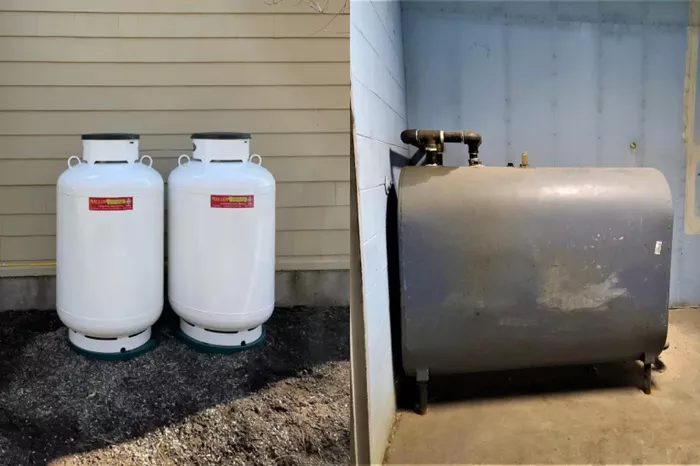Heating your home efficiently and cost-effectively is a primary concern for homeowners, especially in regions with harsh winters. Among the various options available, fuel oil and propane are two common choices. In this comprehensive guide, we’ll explore the intricacies of fuel oil and propane as heating fuels, comparing their costs, delivery methods, and other critical factors to determine which option offers the best value for homeowners.
Fuel Type Comparison
Fuel oil, also known as home heating oil, and propane are both widely used for residential heating. Each fuel has its unique characteristics and delivery methods.
Fuel Oil
Fuel oil is typically delivered by truck and pumped into storage tanks, usually located in basements or outdoor enclosures. This viscous liquid is prized for its high energy density, making it an efficient heating fuel. However, fuel oil combustion can be more challenging compared to propane due to its viscosity and combustion characteristics.
Propane
Propane is delivered by truck to storage tanks, which can be installed above or below ground. Unlike fuel oil, propane is a gas at room temperature and is stored under pressure in its liquid form. Propane equipment, including furnaces and boilers, tends to require less maintenance compared to fuel oil systems. Additionally, propane is a versatile fuel, commonly used not only for heating but also for cooking, water heating, and powering outdoor appliances such as grills and generators.
Cost Comparison
When evaluating the cost-effectiveness of fuel oil versus propane, it’s essential to consider their respective costs per unit of energy. While both fuels are typically sold by the gallon, natural gas is measured in cubic feet. Let’s break down the cost comparison based on the heat per unit (Btus):
Fuel Oil
Energy Content: 137,381 Btu/gallon
Cost: $2.12 per gallon
Cost per 100,000 Btu: $2.12 / (137,381/100,000) = $1.54
Propane
Energy Content: 91,452 Btu/gallon
Cost: $1.77 per gallon
Cost per 100,000 Btu: $1.77 / (91,452/100,000) = $1.93
Natural Gas
Energy Content: 1,037,000 Btu/thousand cubic feet
Cost: $10.51 per thousand cubic feet
Cost per 100,000 Btu: $10.51 / (1,037,000/100,000) = $1.01
From this comparison, it’s evident that fuel oil has a higher cost per 100,000 Btu compared to propane and natural gas. However, it’s important to note that regional variations in fuel prices and availability can influence these cost comparisons.
See also: Oil Prices Rise As Opec+ Keeps Cuts, But Demand Is Still A Worry
Other Considerations
While cost is a significant factor in choosing between fuel oil and propane, several other considerations merit attention.
Combustion Process
Fuel oil combustion is more complex compared to natural gas or propane. Gas has its pressure when flowing into the combustion chamber, facilitating the burning process. In contrast, fuel oil must be pumped to the oil burner, adding complexity to the combustion process.
Maintenance Requirements
Oil burners are more sensitive to wear and soot deposits compared to propane systems. As a result, fuel oil systems typically require more frequent maintenance, leading to higher ongoing costs. Propane equipment, with its cleaner combustion process, generally requires less maintenance, contributing to potential long-term cost savings for homeowners.
Environmental Impact
In recent years, there has been growing concern about the environmental impact of various heating fuels. While all fossil fuels contribute to carbon emissions, propane is considered a cleaner-burning fuel compared to fuel oil. Propane combustion produces fewer greenhouse gas emissions and particulate matter, making it a more environmentally friendly option for homeowners conscious of their carbon footprint.
Energy Efficiency
Another crucial factor to consider is the energy efficiency of the heating system. While fuel oil and propane offer comparable energy content per unit, the efficiency of the heating equipment can vary significantly. High-efficiency furnaces and boilers can help reduce overall fuel consumption, mitigating the impact of higher fuel prices.
Conclusion
In the debate between fuel oil and propane, the choice ultimately depends on a homeowner’s specific needs, preferences, and priorities. While fuel oil may have a higher cost per unit of energy compared to propane, other factors such as maintenance requirements, environmental considerations, and energy efficiency must also be taken into account.
Before making a decision, homeowners should conduct a thorough assessment of their heating needs, evaluate the availability of each fuel in their area, and consider long-term cost implications. By weighing these factors carefully, homeowners can make an informed choice that meets both their budgetary and environmental goals. Ultimately, whether fuel oil or propane is cheaper depends on a multitude of factors, and each homeowner must weigh these considerations to determine the best option for their home heating needs.
Related topics:
Fuel Filters vs Oil Filters: What’s the Difference?

